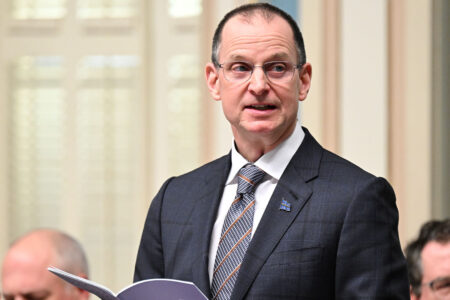
Bilingualism – as enshrined in the Official Languages Act of 1969 and subsequently (for education) in the Canadian Charter of Rights and Freedoms of 1982 – was, and remains, a noble endeavour, giving English and French equal legal status and ensuring all Canadians the right to education in their native tongue. Together, they embodied the dream of a nation in which both languages would be respected and understood (at least by a growing educated minority.) But that dream is dying. The results of the 2021 census are the latest falling bricks in an already fragile edifice. What went wrong and with what might that admirable dream be replaced?
Falling numbers
The answer to the first part of my question is no mystery. The 2021 census confirms what we already know. French continues to decline, now below 20 per cent of the Canadian population, whether measured by mother tongue or language spoken in the home. Below what threshold does functional bilingualism as a federal obligation cease to be sustainable? Outside Quebec (the ROC or Rest of Canada), the numbers have fallen below a point difficult to reconcile with full bilingualism – mother-tongue francophones are only 3.2 per cent (down from 3.5 per cent in 2016) and less than two per cent for those who still maintain French in the home. With the exception of holdouts in Eastern and Northern Ontario, and Acadia, French in the ROC has little day-to-day relevance. Why, aside from specific career paths, learn French?
However, the threat to the bilingual dream is not only a matter of numbers, but also of more subtle forces at play.
English is not just any language
It would be much easier if Canada’s two languages were equally worthwhile learning as a second language. But they are not. The speed with which English has risen to become the world language and the parallel speed with which French has declined as a world language have few parallels in history. I still remember a time when the expected second language of any educated Pole or Portuguese was French. Much of the blame must go to geopolitics: the rise of the U.S.; the British Empire’s linguistic legacy; and English today being the lingua franca of South and East Asia. The advent of the digital era struck the final blow. The internet needed a shared language, and that language is English.
Amending the Official Languages Act: A New Vision of Bilingualism?
Is modernizing the Official Languages Act a mission impossible?
Strengthening French language laws in Canada: Three major legislative initiatives
English simply is no longer only a language, but also a basic life-tool such as math and reading that every ambitious parent from China to Mexico hopes his son or daughter will master. Young Germans, Belgians and others are expected to learn English in school as the common language today of European youth. The pressure to learn English is no less strong in Quebec, not to mention among minority francophone populations in the ROC. It should thus come as no surprise that the 2021 census reveals the majority of Quebecers (51.7 per cent) now understand English – an almost three-percentage-point increase over five years earlier and a trend that we can safely expect to continue to grow.
Young francophone Québécois, like their counterparts elsewhere, are learning English, not because of federal bilingualism and certainly not because of provincial legislation, but simply because English has become an essential life-tool. Readers with a taste for irony, looking at the census figures (figure 1), might be tempted to conclude that Quebec’s Charter of the French Language (Bill 101) has been more successful in promoting bilingualism then the Official Languages Act. Humour aside, the association is not totally false: bilingualism flourishes where French is strong.
The secession of the ROC
Quebec is becoming progressively more bilingual but the ROC has become less so since 2001. Canada outside Quebec is slowly but surely deserting bilingualism, which, while regrettable, is neither surprising nor necessarily blameworthy. Why learn French when almost all francophones speak English anyway? Francophones who don’t speak English account for less than one-half of one per cent of the ROC population. Its Acadian strongholds notwithstanding, unilingual francophones have fallen to 7.9 per cent from 8.6 per cent of New Brunswick’s population. Hearst, reputedly the French-est municipality in Ontario (83 per cent have French as their mother tongue), provides a telling example of the growing spread of English and the declining need for French. Some 76 per cent of francophones there were bilingual in the 2021 census, up three points from 2016, compared to 30 per cent for anglophones, down seven points from 2016.

The decline in the perceived need to learn French outside Quebec is further fueled by the evolution of English Canada’s self-perception. The patriotic impetus to learn French as an affirmation of Canadian identity, strong during the Trudeau père years, no longer has the same hold. English Canada no longer needs French to validate its differences from the U.S. – an evolution accelerated by the recent division evident in American politics. Canada is demonstratively different and no longer needs French to prove it to the world.
The linguistic – and some might add emotional – secession of the ROC from Quebec means that French risks being increasingly perceived as a “foreign” language, useful in specific instances (i.e., aid work in Haiti or Congo) like other foreign languages, but not part of the expected cultural baggage of a (non-francophone) Canadian. The odds of a non-francophone outside Quebec knowing French today are about one in 15. Unfortunately, I see the odds falling further.
A new linguistic geography: balancing rights and security
A pessimist or cynic might conclude that this is simply English Canada reverting to its natural state, never really in love with Trudeau’s crazy bilingual dream. That is too simple. Rather, the 2021 Statistics Canada data confirm the steady hardening of Canada’s linguist map. This is an entirely natural evolution. To survive, languages need a geographic, demographic, and (yes) political base. Canada’s fragmented linguistic geography – a result of its history of settlement – was never sustainable. Small linguistic islands, unless politically protected, rarely survive beyond the third or fourth generation.
Gravelbourg – an emblematic francophone Saskatchewan village, first settled in the early 1900s and a cathedral city of a Roman Catholic diocese – still registered a solid francophone majority at the time of the 1961 census. Two generations later, the 2021 census informs us that French (in terms of home language) has fallen below 10 per cent of the village’s population and that understandably only a small minority (five per cent) of the village’s majority anglophone population understands French. The demise of French in Gravelbourg is regrettable. Some traces will undoubtedly persist over several generations such as the names of schools and community centres, but the end result is not in doubt.

Canada is basically dividing into two linguistic regimes: (a) one province, Quebec, which strives to uphold French as the dominant language, common to all, while still attempting to respect the rights of its anglophone population to schooling and public services; (b) all the rest, where the guiding assumption is equal-language rights at least in principle – i.e., the right to schooling and to public services in one’s native language, the latter fully respected only in New Brunswick for provincial services. The distinction is important.
Protecting language rights and protecting a language (i.e., as the dominant means of communication within given spaces) are not the same thing. The Charter and Official Languages Act will continue to ensure that the citizens of Gravelbourg and Hearst who so wish (and are rights- holders for education purposes) will continue be served in French in matters falling within the jurisdiction of those two laws. But they cannot, even in federal workplaces, ensure the dominance of French. English-speakers, or francophones who prefer English, have an equal right to work in either official language.
None of this should come as news. However, the upshot is a model of bilingualism, unarguably noble in its initial intent, but one that makes it difficult to effectively protect language communities outside Quebec and is unable to guarantee them secure linguistic spaces. The emergence of English as the world language compounds the difficulty. Other nations – Switzerland being a prime example – have adopted different models, with one dominant language per jurisdiction (canton, municipality etc.) the rule. Overlapping language rights are the exception. If Hearst were in Switzerland, with anglophones (mother tongue) less than 10 per cent of the population, it could be declared a unilingual French municipality with no obligation to provide public services in English. This, of course, is unthinkable in Canada. The citizens of Hearst will remain free to choose French or English.
Modernization of Official Languages Act impacts all Canadians
The linguistic division of Canada will continue. I see little hope of the amended Official Languages Act (Bill C-13) arresting the decline of French outside Quebec, as I commented in June in an analysis for the Centre of Excellence on the Canadian Federation. The fate of bilingualism outside Quebec is directly tied to the use and usefulness of French, which inevitably means going beyond French as a right to French as a necessity for social interaction and career advancement. However, building secure linguistic spaces and institutions where French is a necessity cannot be achieved without limiting the use of English. Only Quebec has corresponding legislation. I do not foresee any province outside Quebec restricting the right to English services and schooling in French-majority communities, nor do I see Ottawa restricting the right to work in English in federal institutions.
Let me conclude with a last datum from the 2021 census, which came as a surprise even to me. Twice as many people speak English at home in Quebec today (one million) as do French in the rest of Canada. Quebec is now the only province where Canada’s great bilingual experiment is a living reality, where the two language communities live side-by-side without either threatening to assimilate the other, and where the majority (or close to it) of each group understands the language of the other. The policy implication is self-evident: if bilingualism is to be a living reality outside Quebec practiced not just by francophones, a new balance needs to be struck between language rights and language security.
The principal hurdle to adopting stronger measures to promote French outside Quebec is not legal but political. This is where the federal Bill C-13 falls short. It could have gone further in pointing the way to a new vision of bilingualism: a Canada with two languages, each with the right to secure spaces, while remaining true to the founding ideal of two languages respected across the nation.
A few amendments to C-13 could help, including:
- Recognition of the pivotal role of Quebec in the maintenance of French in Canada;
- Harmonization of federal language legislation with Quebec’s, notably for workplaces;
- Recognition of the distinctive role of Acadia in the maintenance of French in Canada;
- Grant more substance to the definition of “regions with a strong francophone presence;
- Promote French as the common language of work in federal and federally regulated workplaces in regions outside Quebec that have a strong francophone presence;
- Declare Ottawa a special “priority francophone zone;”
- Further enhance the interpretation of “substantive equality.”
Canada should start a conversation on language security, which indeed might also extend to Indigenous languages – Inuktitut being the most obvious case. As in Switzerland, should language rights cease to follow individuals in some cases, education being the most sensitive? Bill 101 set a precedent for immigrants. Residents of Quebec who did not receive their primary schooling in English in Canada cannot send their children to English schools. Might the same restriction be warranted in certain regions outside Quebec with a strong francophone presence? This is of some importance given the government’s focus on francophone immigration. Taking the Swiss analogy a step further, can we imagine making French education compulsory for all newcomers in certain places?






